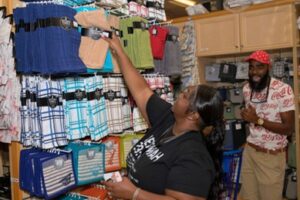#Bahamas, April 30, 2018 – Nassau – While giving his contribution to the Interception of Communications Bill 2017, Minister of National Security the Hon. Marvin Dames termed it a comprehensive contemporary law to fight “sophisticated technologically savvy criminals and dismantle their criminal networks.”
“From the outset, let me dispel this ridiculousness of the Interception of Communications Bill being referred to as a ‘Spy Bill’,” Minister Dames said in the House of Assembly, on April 25, 2018. “For all within hearing distance of my voice, it is not and I will explain in my Contribution this morning.
“The word ‘spy’ connotes breaking the law and impinging upon the constitutional rights of an individual. The mere fact that we are in honourable House debating this very important Bill, represents an urgent need to send a clear message that this Government, is committed to adhering to the Constitution of The Commonwealth of The Bahamas and the rule of law and in no case assuming the posture of politics of disrespect and arrogance.”
Minister Dames pointed out that a responsible Government does not come to Parliament to inform its citizens and pass legislation only to ignore the very legislation it was responsible for bringing to Parliament.
“This does not make sense,” he stated. “The entire absurdity of the Interception of Communication Bill being referred to as a ‘Spy Bill’ needs to be put to a perpetual rest.”
Minister Dames said that the Interception of Communication Bill was timely and pertinent to The Bahamas’ national security and well-being as a nation. He added that the foremost aim of the Bill was to thwart any and all national security threats to Bahamian citizens, residents and visitors.
“This Bill is a vital tool to assist in our crime fighting strategies, particularly in combating drug, human, and gun trafficking, gang violence, cyber crimes and other forms of transnational organised crimes,” Minister Dames said. “Without legislation such as this one, law enforcement agencies will be severely handicapped and disadvantaged in their attempts to detect, collect, analyse, investigate and prosecute associated crimes in a world where technology related platforms have become the preferred means of communications across the globe especially for organised crime organisations.

“Therefore, the question, we must now ask ourselves, ‘Who do we prefer to have the upper hand, organised crime groups or the men and women in law enforcement who have taken an oath to protect us all?’.”
Minister Dames noted that the Bill sought to provide a single legal framework within which the interception of all communications on public and private systems would be authorized inclusive of public telecommunication operators and Internet providers. The Bill, he added, provides for the interception of communication carried wholly or partly by wireless telegraphy and also covers all mail handling systems including parcel and courier services.
“This Bill further provides for the use of certain devices for listening to private conversations,” he said. The Bill, once passed, will come into operation on a day decided by the National Security Minister and it will be publicly announced.”
Minister Dames noted that the word communication, as defined in Section 2 of the Bill, included anything transmitted by means of a postal service, including a postal article; anything comprising speech, music, sounds, visual images or data of any description; and signals serving either for [impart] of anything between persons, between a person and a thing or between things or for the actuation or control of any apparatus.
Intercept or Interception, as defined in the same section of the Bill Section, he added, included aural or other acquisition of the contents of any communication through the use of any means, including an interception device, so as to make some or all of the contents of a communication available to a person other than the sender or recipient or intended recipient of that communication; monitoring of a communication by means of a monitoring device; viewing, examining or inspecting of the contents of any communication and diverting of any communication from its intended destination to any other destination.

Minister Dames stated that, in the last two decades, information and communication technologies (ICTs) have continued to advance, thus highlighting the critical need for the collection of data to be used as a fuel to protect and enhance national security interests.
“The smartphone, which can be referred to as one’s most personal computer, is owned by approximately 2.5 billion of the world’s population, according to Statista, a leading provider of consumer data,” he said. “The Pew Research Center, a nonpartisan fact tank, found in a recent study an estimated 95 percent of all Americans owned cellphones; nearly three quarters of American adults own desktops or laptops; half of the adult population own tablets and around one in five own e-readers.
“I suspect that the use of ICTs in The Bahamas is widespread,” he added. “With this ever increasing use of communication gadgets and its rapid evolution, it is imperative that legislation allow law enforcement to keep pace with changing technology and prevent criminals from abusing communication devices to commit offences.”
That, Minister Dames said, was the crux of the Bill: the necessity for law enforcement to address dangers posed by criminals using advanced technologies such as newer encrypted forms of Internet-based communications,inclusive of computers, Ipads, smartphones and other similar instruments.
“I can speak of personal experiences in which police acting on intelligence pursued criminal networks in this country and in doing so, it was not uncommon for criminal groups to have had multiple disposable prepaid phones which they were able to quickly discard so as to evade detection,” Minister Dames said. “This ‘modus operandi’ is nothing new and will only increase in occurrences.”
“As such, we have to equip our law enforcement agencies with the applicable legislative tools to remain relevant and collect the necessary investigative information by way of modern platforms for the sole purpose of protecting the local as well national security interests of the people they have sworn to protect,” he added.
By Eric Rose


















